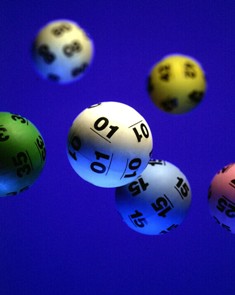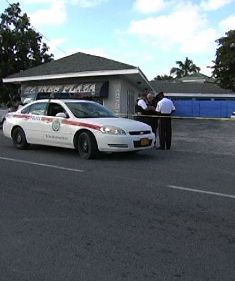
 (CNS): Although the premier has said he is willing to support a public vote on the introduction of gambling to the Cayman Islands, those who are against it have not changed their minds and are now mobilizing the community’s opposition to a legalised lottery. In a matter of just days the Cayman Ministers Association drew more than 1,200 signatures against gambling versus the pro-petition organised by Gilbert McLean, which drew less then five hundred over several months. Despite the boost to the pro-position from the National Investment Council, which recommended government review the gambling laws in order to attract much needed new revenue, there is still considerable opposition in Cayman to any form of gambling.
(CNS): Although the premier has said he is willing to support a public vote on the introduction of gambling to the Cayman Islands, those who are against it have not changed their minds and are now mobilizing the community’s opposition to a legalised lottery. In a matter of just days the Cayman Ministers Association drew more than 1,200 signatures against gambling versus the pro-petition organised by Gilbert McLean, which drew less then five hundred over several months. Despite the boost to the pro-position from the National Investment Council, which recommended government review the gambling laws in order to attract much needed new revenue, there is still considerable opposition in Cayman to any form of gambling.
Opposition to the idea of a national lottery as well as licensed casinos is being coordinated by the Cayman Ministers Association but the objections are not confined to religious ones. There is also political opposition from members of the People’s Progressive Movement, who have always stood against legalised gambling, and from other members of the community that consider gambling a tax on the poor and detrimental to society.
The resurgence of the opposition to gambling has been galvanised by the CMA as a result of a renewed push by those in favour, but this time there is a legal mechanism under the Constitution to pave the way for a referendum. Talkshow host Gilbert McLean set out to gather enough signatures last year to instigate the first people’s referendum to introduce a national lottery. However he did not gather enough signatures to automatically trigger a referendum, which requires the support of 25% of registered voters, but McLean still handed the petition to the premier as government can hold a referendum outside of those parameters.
More recently a number of private sector bodies, such as CITA, the Chamber of Commerce, CIREBA and Cayman Finance, as well as a various private sector individuals, recently got behind a National Investment Council proposition to overturn the gambling laws and introduce a national lottery or limited gaming licenses as one of a number of revenue raising measures to counter the concept of taxation. (See
clarifying statement from CITA and also
see clarifying statement from Chamber)With the illegal numbers game already being played regularly in Cayman and generating income for the black market, there is considerable support from the private sector to re-direct the earnings from the criminal underworld to the Treasury.
Independent MLA for North Side, Ezzard Miller, also supports the introduction of legalised gambling. "I support the introduction of both the national lottery and casinos under licence by government, but not operated by government, with heavy licensing fees that are a percentage of gross revenue as high as maybe 35% for the operators and 15% for the winners," Miller told CNS.
Although the premier has said he is willing to put the subject to the vote, McKeeva Bush has not yet said whether he personally supports reversing the gaming laws or whether the UDP is supporting the idea and says it is a matter of personal conscience.
Those who are against the concept say legitimising a criminal enterprise does not make it right and that with gambling comes a host of social problems that will outweigh any financial gain to government, from increased bankruptcies to suicides.
Rev Nicholas Sykes, a member of the CMA who spoke with CNS this week, said that there is overwhelming evidence that it increases crime and creates wide social problems. “Legitimising any negative activity will increase and validate it,” he said. “Support of gambling by the authorities is not going to make it right; it will just make the impact on society worse.” Sykes also said that where gambling is introduced it is rarely of any significant financial benefit to the community as it is usually just a limited number of operators who gain from the profits and the wider community simple suffers from the crime and poverty that comes with it.
Sykes said that those in the opposition campaign were hoping the government would maintain the status quo regarding the law but if there was to be a public vote he hoped it would be done via the constitutional provision of a referendum, where only registered voters were able to participate rather than a national poll, which could include people not on the electoral register, as had been suggested.
Pastor Al Ebanks, the chair of the Constitutional Review Committee, a long time campaigner against the concept of gambling and a former president of CMA, said he would be happy to see an official referendum but having done a considerable amount of research on the downside to gambling he hoped the people would be well informed about the negative effects before participating in a national vote.
“Wherever it is legalised there is always an increase in crime, suicides and a breakdown of families,” Pastor Al said. “I would support the idea of a referendum and would want to see a campaign to inform the people of the Cayman Islands about the very real negative impact it would have on our society. People talk about the financial benefit from the fees but they are not necessarily talking about the real cost.”
The PPM is also against the legalisation of gambling, a position former education minister Alden McLaughlin said the party has always held, but he too says that he would support the idea of a referendum on the subject. “We have always taken a position against legalised gambling and there has been no reason presented to change that but we do support a referendum,” he said. “Following a referendum, despite the party’s position, whatever the outcome we would be duty bound by that democratic decision.”
The opposition to gambling is also supported by other sectors of the community.
Local small business owner and community activist Billy Adam is also very much against the introduction of any form of legalised gambling as he says he is concerned about the corruption which is invariably associated with all gambling.
"Gambling in general is really a tax on the poor; this is specifically true of the lottery racket. Those who can least afford it suffer the most from the diversion of funds for taking care of their families’ needs," he said.
“To legalise gambling, be it lottery or casino, will be rewarding criminals by legitimising what is now a crime. In the Cayman Islands the gambling criminals control many political candidates and MLAs, they may now soon be rewarded when the crime of gambling is legalised, and shamefully supported by some in the business community. Legalising gambling would be further retreating from being a law abiding community to a criminal appeasingcommunity, and all who want to stop the decline of the Cayman Islands must fight against all who would reward criminals by legalising any form of gambling.”
Adam asked, “What common crime will politicians want to legalise next — no parking, speeding, theft, drugs, rape or murder?”
He said that the revised Constitution should have had a section specifically stating “No form of legal gambling in the Cayman Islands” and that this should now be the referendum subject.
“It was interesting to note that in the just completed revision to the UK’s Cayman Islands Constitution no political or private sector groups vocally joined in the request from some of us to include the Constitutional no gambling provision,” Adam added.
The CMA is continuing to circulate its petition to back up the representations that have been made to government regarding the position of those who are against the legalisation of any form of gambling, which includes either a national lottery or casinos.
Continue Reading

 (CNS): The man who was charged with attempted murder in connection with a daylight shooting in March of this year at Barnes Palaza in George Town has been released by the courts. Charges against 32-year-old Royden Robinson from West Bay, who was accused of shooting Sandra Connor in the face, have been dropped. Robinson, who had maintained his innocence from the point of his arrest, was also charged with possession of an unlicensed firearm. A Summary Court magistrate ruled there was insufficient evidence for the case to move forward to the Grand Court, News 27 has reported. Connor was hospitalized after the incident, having received serious injuries to her face.
(CNS): The man who was charged with attempted murder in connection with a daylight shooting in March of this year at Barnes Palaza in George Town has been released by the courts. Charges against 32-year-old Royden Robinson from West Bay, who was accused of shooting Sandra Connor in the face, have been dropped. Robinson, who had maintained his innocence from the point of his arrest, was also charged with possession of an unlicensed firearm. A Summary Court magistrate ruled there was insufficient evidence for the case to move forward to the Grand Court, News 27 has reported. Connor was hospitalized after the incident, having received serious injuries to her face.
 (CNS): Although the premier has said he is willing to support a public vote on the introduction of gambling to the Cayman Islands, those who are against it have not changed their minds and are now mobilizing the community’s opposition to a legalised lottery. In a matter of just days the Cayman Ministers Association drew more than 1,200 signatures against gambling versus the pro-petition organised by Gilbert McLean, which drew less then five hundred over several months. Despite the boost to the pro-position from the National Investment Council, which recommended government review the gambling laws in order to attract much needed new revenue, there is still considerable opposition in Cayman to any form of gambling.
(CNS): Although the premier has said he is willing to support a public vote on the introduction of gambling to the Cayman Islands, those who are against it have not changed their minds and are now mobilizing the community’s opposition to a legalised lottery. In a matter of just days the Cayman Ministers Association drew more than 1,200 signatures against gambling versus the pro-petition organised by Gilbert McLean, which drew less then five hundred over several months. Despite the boost to the pro-position from the National Investment Council, which recommended government review the gambling laws in order to attract much needed new revenue, there is still considerable opposition in Cayman to any form of gambling.